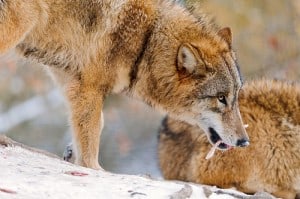There’s a daily battle raging within each of us. Which side wins depends on the choices each of us makes.
The story of this battle is told through a familiar folktale in which a grandfather and his grandson are talking. The Grandfather tells his grandson, “A fight is going on within me. It is a fight between two wolves. One is evil, the other is good. The same fight is going on within you, and in every other person.” The grandson asks, “Which wolf will win?” The grandfather replies, “The one you feed.”1
As we await the results of the Academy Awards it has been hard for me to not think of the other wolf in the media. The one that has been nominated for five Oscars and is being advertised as “the movie of our time” – the Wolf of Wall Street. It’s been getting rave reviews, and with a star studded cast and Scorsese at the helm, it’s to be expected. But when I walked into the movie theater to watch this film, I had no idea what I was getting myself into.2 The film recounts Jordan Belfort’s chase of the “American Dream” as an investment broker and ending up ridiculously successful before he reaches the age of 30.
I recognize the hyperbolic approach that Scorsese uses in looking at Wall Street in the 80’s and 90’s. Yet, I struggle with moving beyond the fact that it is still based on a true story, and some of even the most outrageous things in the movie actually happened. In some way these things are still happening. The allure of Wall Street continues to attract young professionals to live out their own American Dream and “making it big.”
In a heartfelt Op-Ed piece in the New York Times, Sam Polk, a former hedge-fund trader, vulnerably shares about his life on Wall Street becoming entangled with an addiction to money. Polk, describes a similar greed that was evident throughout The Wolf of Wall Street:
I was a giant fireball of greed. I’d think about how my colleagues could buy Micronesia if they wanted to, or become mayor of New York City. They didn’t just have money; they had power — power beyond getting a table at Le Bernardin. Senators came to their offices. They were royalty.
Polk eventually realizes that the wolf he was feeding was only leading to a deeper “spiritual malady.” He says:
There were plenty of injustices out there — rampant poverty, swelling prison populations, a sexual-assault epidemic, an obesity crisis. Not only was I not helping to fix any problems in the world, but I was profiting from them.
Belfort would have to hit rock bottom in order to see which wolf he was feeding. As I walked out of the movie theater after watching the Wolf of Wall Street, I began to wrestle with the question of which wolf I am feeding in my life. After leaving hedge-fund trading, Polk began to speak in prisons, volunteer his time and has begun a non-profit helping poor families struggling with obesity. For myself, I look to the vows we make as Jesuits of poverty, chastity and obedience to help me feed the good wolf. I believe that the work Polk is doing now and our Jesuit vows stand as a counter cultural witness to the values of riches, sex, and power that Belfort and Polk wrestled with, and a testimony to which wolf within each of us is going to win.
******
Wolf image via Flickr user Tambako the Jaguar, and it can be found here.
- This story is often wrongly attributed to the Cherokee tribe, you can read the whole folktale and learn more about its misappropriation here. ↩
- In my defense, my Jesuit brother and I had meant to watch The Hobbit: Desolation of Smaug, but it was no longer playing. Quick thinking led us to this film. ↩



